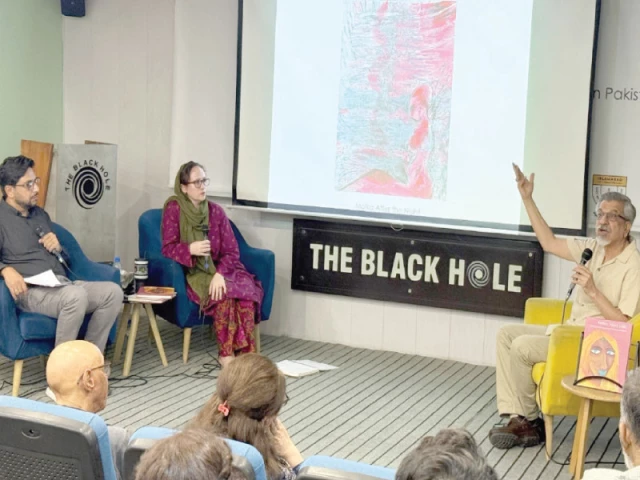Artist humanises sex workers in paintings
Replaces stereotypical representation through male gaze with one of dignity

The launch of the book "Malka Aliya Laila: Paintings on Stories of Sex Workers in Pakistan" at The Black Hole was an evening charged with emotion, art and reflection.
Organised by Gallery 6 in collaboration with the East-West Center Alumni Association – Islamabad Chapter, the event drew artists, academics, writers and students to witness a rare convergence of public health, art, and the lived realities of marginalised women.
The programme was moderated by senior journalist and Secretary General of EWCA-IC, Faiz Muhammad Paracha, who introduced the author by noting that "Dr Arjumand Faisel has lived many lives in one." From starting as a journalist in class ten and becoming PTV's youngest compere at seventeen, to training as a medical doctor and later earning postgraduate degrees in public health from Pakistan and the USA, Faisel has led a remarkable professional life.
Alongside this, his passion for art led him to establish Gallery 6 in 2008, now the largest private art gallery in Islamabad, and to found the Arjumand Painting Award, the country's leading biennial art prize.
It is this duality - health and art - that defines "Malka Aliya Laila." Paracha reminded the audience how sex workers have been depicted in art worldwide: sometimes sympathetically and often through the male gaze. "Dr Faisel's contribution is of a different order," he said. "He does not present sex workers as objects, but as human beings. Just as Manto humanised them through stories, Faisel has done so with paintings."
Leading art critic Cosima Brand delivered an emotional response, remarking, "It is with eyes brimming with tears that I contemplate this work. Very rarely does art speak so directly to the soul. Here is a man trained to collect data for the Ministry of Health but overwhelmed by human realities he could not capture with numbers. Every injustice, every defiant stare, every broken yet proud woman finds space in these works."
Reflecting on the genesis of the book, Dr Faisel recalled his HIV/AIDS research in the early 2000s. "What I saw, heard and felt was unbearable. These were not data points, but human experiences etched into memory." Those stories later found expression on canvas. Using Expressionism, he translated pain, resilience and dignity into works that go beyond likeness to capture inner truths.
The audience viewed a selection of these paintings in a multimedia presentation, followed by a discussion on the ethics of representing marginalised women and the emotional toll on the artist.
By the evening's close, the consensus was clear, "Malka Aliya Laila" is more than a book. It is both an artistic and humanitarian statement - bridging medicine, research and art to give a voice and dignity to those too often silenced.





















COMMENTS
Comments are moderated and generally will be posted if they are on-topic and not abusive.
For more information, please see our Comments FAQ